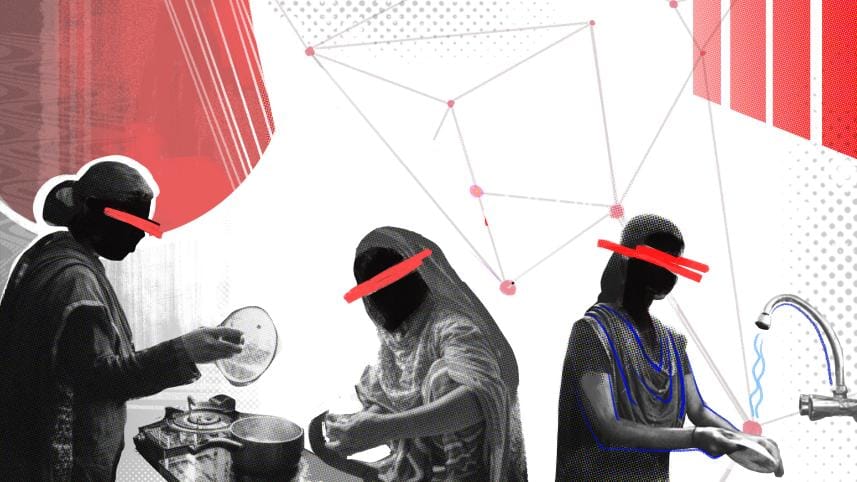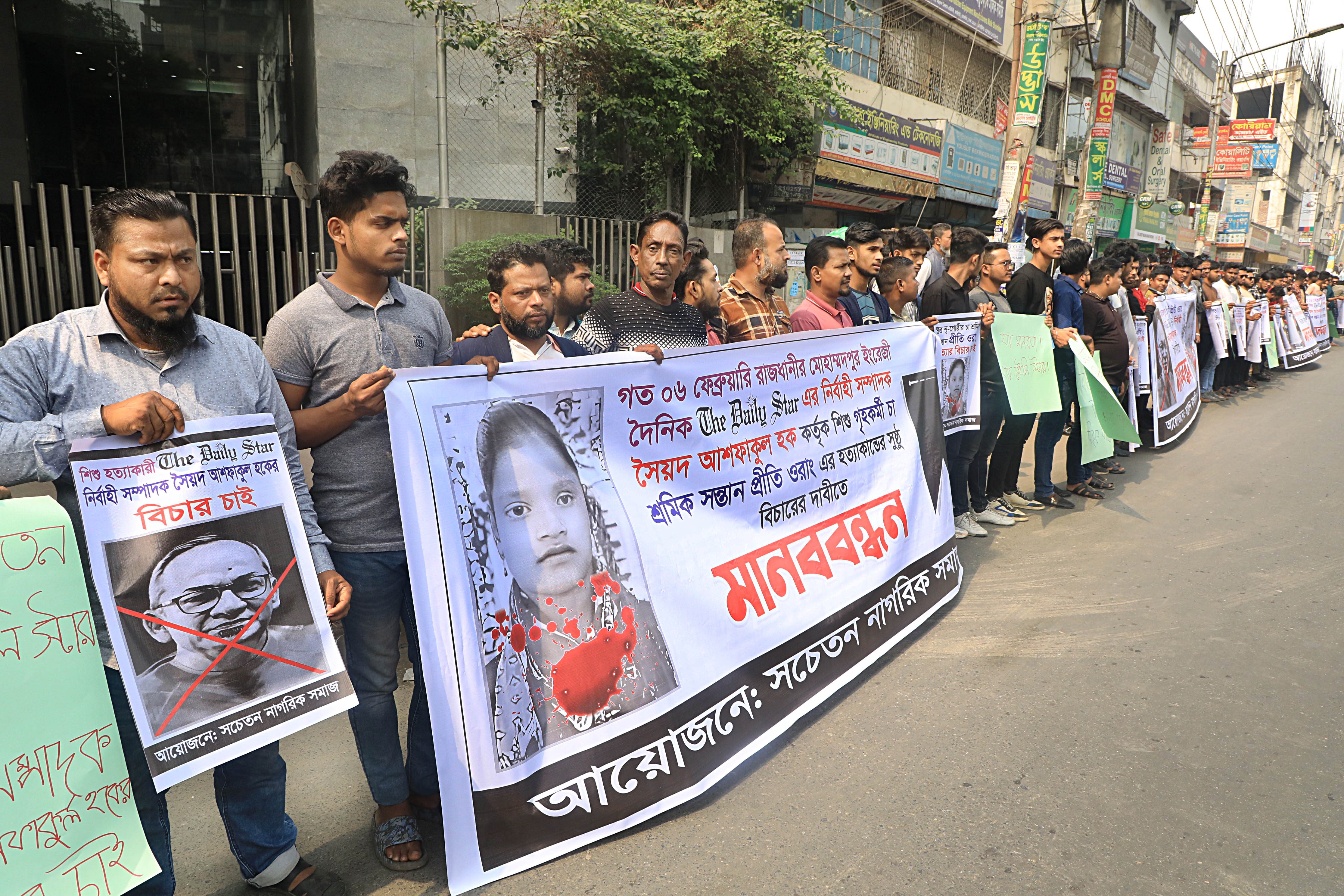Preeti Urang and our myopic laws

The death of 15-year-old Indigenous domestic worker Preeti Urang on February 6, upon falling through an opening from the eighth-floor residence of The Daily Star Executive Editor Syed Ashfaqul Haque, shocked us all. Half a year earlier, nine-year-old Ferdausi, another child domestic worker of the same household, fell off from the same balcony and sustained severe injuries. Another domestic worker, 40-year-old Anwara, who had been working for Md Tariqul Islam, an assistant commissioner of Dhaka Metropolitan Police's (DMP) Detective Branch, died on February 19 upon falling from the roof of a 10-storey building.
These are not isolated incidents, but part of a larger pattern that makes us look critically into the legal regime for workers toiling in the informal sector, particularly the households. Overall, the legal regime on domestic workers in the country is a patchwork, and while we have apparently laudable child- and women-friendly laws, Supreme Court decisions, and policies from the past, they all unfortunately fail miserably in addressing the plight of informal sector workers, including—but not limited to—domestic aides.
An important judicial decision in this regard is Bangladesh National Women Lawyers Association (BNWLA) vs the Cabinet Division, Represented by Cabinet Secretary and Others. In this decision, the High Court Division laid down elaborate guidelines for upholding the rights of child domestic workers. Crucially, among others, the court directed the government to include domestic workers within the definition of "worker" in the Bangladesh Labour Act, 2006. The court particularly emphasised monitoring and prosecuting cases related to violence upon domestic workers, noting with dismay that often the prosecution investigates and tries perpetrators in disinterested and at times motivated ways, resulting in them being acquitted or discharged, or even remaining unscathed.
The decision is praiseworthy on many counts, especially because it takes a rights-based stance, as opposed to an uncritically protectionist one. Indeed, workers in the informal sector are not essential victims in need of getting "saved." They are individual rights holders whose rights (and not them) need protection and enforcement. It also emphatically strikes at the root of public-private dichotomy by laying down guidelines to regulate the "cult of domesticity."
A major problem with the decision, however, is that it sees "child domestic workers" as a monolithic category. Although the court urged that the domestic workers come from a poverty-stricken background and deserve all the more attention from the government and the authorities concerned, it did not really dig deeper into this loosely thrown statement. For many marginalised children, at the intersection of multiple overlapping identities, a unique harm is produced. Their socioeconomic background, ethnic or religious identity, gender identity or expression, all play a determinant role in their identity formation and the kind of harms they in fact have to sustain. Sweeping laws, policies or guidelines that imagine every child as the same miserably fail to address the different kinds of harms that they undergo. The same goes for women and men working as domestic aides.
Despite the passage of a substantive period, the otherwise useful guidelines have not really been put into effect. The only development in this regard was laying down of the Domestic Workers Protection and Welfare Policy, 2015. The "policy," while non-binding, unsurprisingly does not go far enough. Furthermore, it has some inherent lacunae as well—for instance, the policy is subject to subjective interpretation of employers with regard to work and recess hours of domestic workers. Also, the policy entrusts the government with the responsibility to deal with abuses of domestic workers, and despite meaning well, creates an accountability deficit on part of the employers in question.
In this context, many argue that the Nari O Shishu Nirjatan Daman Ain, 2000 comes in aid of domestic workers who are predominantly women and children in our country. However, the said law plays only a remedial role in this context—it does not as such create a preventive or positive protection regime for domestic workers. Pertinent also are the sexual harassment guidelines laid down by the Supreme Court. In 2011, the High Court Division formulated guidelines essentially to make the "public" space (e.g., education and workspaces) safe for women. But what about marginalised women and children of various intersecting identities who work in the informal sector (including the households), and for whom there is virtually no distinction between the private and the public? The employers' "private" is essentially their "public," and the guidelines do not really help in this regard.
On the international plane, a significant instrument on the rights of domestic workers is the Domestic Workers Convention, 2011. Bangladesh, however, is yet to ratify this important piece of instrument, and to move proactively into the rights-based domain for the domestic workers.
Overall, the patchwork around the domestic workers suggests that they are yet to be deemed as "equals" of others who are subjects of specific laws. We have special laws for women and children, but "domestic workers" is a different class on its own, predominantly constituting a subclass within women and children. They are the paradigmatic subalterns within our society where different strata are defined and hierarchised by power. As a corrective, a specific law regulating the minimum age, wage, standards of living, workloads, benefits, social welfare, civil and criminal wrongs committed against such workers, and their specific remedies need to be there. It is particularly important to put in place a binding framework for live-in domestic workers for whom a decent work environment, safety, security, and support are all the more important. A framework can be potentially helpful for the employers as well, in terms of ensuring compliance with the minimum standards with legal certainty and due diligence. The law also needs to draw in the interconnected webs of sex, class, age, and ethnicity together, in order to challenge the multi-layered dominance and hegemony in play, with a multi-axis intersectional approach.
Psymhe Wadud is in-charge of Law & Our Rights at The Daily Star.
Views expressed in this article are the author's own.
Follow The Daily Star Opinion on Facebook for the latest opinions, commentaries and analyses by experts and professionals. To contribute your article or letter to The Daily Star Opinion, see our guidelines for submission.




 For all latest news, follow The Daily Star's Google News channel.
For all latest news, follow The Daily Star's Google News channel. 
Comments